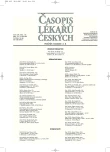Can Modern Infusion Solutions Cause Serious Disruption of Inner Environment of an Organism?
Mohou moderní infuzní roztoky způsobit závažný rozvrat vnitřního prostředí organizmu?
Článek přináší popis případu pacienta, u kterého podávání minerálově vyvážených infuzních roztoků vedlo k rozvratu vnitřního prostředí, vzniku kombinované poruchy acidobazické rovnováhy s významnou metabolickou alkalózou. Pacient J. byl uměle ventilován, po kardiopulmonální resuscitaci. V terapii byla podávána prakticky beze změn kombinace infuze minerálů Plasma-Lyte 148, aminokyselin a 20% glukóza. Během 8 dnů došlo k vývoji těžké metabolické alkalózy (z nedostatku chloridů, fosfátů a dalších příčin), kombinované respirační acidózou. Hladina hydrogenkarbonátů byla zvýšena na 47,2 mmo/l (při normě 24 mmol/l), hodnota base excess na 21,4 mmol/l (při normě 0 mmol/l). Metabolická alkalóza vedla ke snížení citlivosti dechových center, nebylo možno obnovit spontánní ventilaci. Po změně terapie, omezení metabolické alkalózy došlo ke zlepšení celkového stavu. Podání acidifikujících infuzí, doplnění hladin a trvalé hrazení aktuálních ztrát draslíku a fosfátů vedly k úpravě vnitřního prostředí. Společně s podáním dostatečného množství základních živin byla úprava acidobazické rovnováhy základním faktorem, který umožnil obnovení spontánní ventilace a odpojení nemocného od ventilátoru. V krátkém přehledu jsou uvedeny příčiny, které způsobují různý vliv totožných infuzí na acidobazickou rovnováhu nemocných v různých situacích. Článek ukazuje na nutnost kontrol zaběhnutých léčebných schémat, nutnost úprav léčebných postupů dle aktuálních potřeb pacienta.
Klíčová slova:
metabolická alkalóza, acidobazická rovnováha, base excess, Plasma-Lyte 148.
Authors:
K. Kubát
Authors‘ workplace:
Interna MN, Litoměřice
Published in:
Čas. Lék. čes. 2007; 146: 551-556
Category:
Case Report
Overview
The article brings a description of a patient case when an application of mineral balanced infusion solutions led to a disruption of inner environment, beginning of a combined failure of the acid - base balance with a serious metabolic acidosis. Patient J. was artificially respirated after a CPR. During the therapy the patient was given basically without any changes a combination of mineral solution Plasma-Lyte 148, amino-acid and 20% glucose. During 8 days a serious metabolic alkalosis had developed (caused by a lack of chlorides, phosphates and other reasons), combined with respirational acidosis. Hydrogencarbonate level was increased to 47.2 mmo/l (at norm of 24 mmol/l), base excess level to 21.4 mmol/l (at norm of 0 mmol/l). Metabolic acidosis led to reduction of sensibility of the respiratory centers and therefore it was not possible to restore spontaneous respiration. After the therapy change and reduction of metabolic acidosis the state of the patient got better. Application of acidifying solutions, supplementation of phosphate and potassium levels and replenishment of actual losses of phosphates led to regulation of the inner environment. Together with the application of sufficient amount of basic nutrients was the improvement of acid-base balance the key factor which enabled the restoration of spontaneous respiration and disconnection of the patient from the ventilator. In short summary you can see reasons which cause different effect of identical infusions to acid-base balance of the inmates in different situations. The article points to a necessity of controlling groovy medical procedures according to actual patient’s needs.
Key words:
metabolic acidosis, acid-base ballance, base excess, Plasma-Lyte 148.
Labels
Addictology Allergology and clinical immunology Angiology Audiology Clinical biochemistry Dermatology & STDs Paediatric gastroenterology Paediatric surgery Paediatric cardiology Paediatric neurology Paediatric ENT Paediatric psychiatry Paediatric rheumatology Diabetology Pharmacy Vascular surgery Pain management Dental HygienistArticle was published in
Journal of Czech Physicians

- Advances in the Treatment of Myasthenia Gravis on the Horizon
- Possibilities of Using Metamizole in the Treatment of Acute Primary Headaches
- Metamizole at a Glance and in Practice – Effective Non-Opioid Analgesic for All Ages
- Metamizole vs. Tramadol in Postoperative Analgesia
- Spasmolytic Effect of Metamizole
-
All articles in this issue
- Juvenile Hyperbilirubinaemia and Its Early Manifestation in Adolescence
- Milestones of Cardiovascular Therapy. III. Nitroglycerin
- Knowledge Level of Cardiopulmonary Resuscitation in Secondary School Students of Non-medical Specialisation in the Czech Republic
- Non-invasive Detection of Liver Fibrosis in Patients with Chronic Hepatitis C
- Surgery Tracheostomies and Percutaneous Dilatation Tracheostomies – Retrospective Study
- Can Modern Infusion Solutions Cause Serious Disruption of Inner Environment of an Organism?
- Abdominal Tuberculosis in CT Imaging
- Journal of Czech Physicians
- Journal archive
- Current issue
- About the journal
Most read in this issue
- Surgery Tracheostomies and Percutaneous Dilatation Tracheostomies – Retrospective Study
- Juvenile Hyperbilirubinaemia and Its Early Manifestation in Adolescence
- Can Modern Infusion Solutions Cause Serious Disruption of Inner Environment of an Organism?
- Abdominal Tuberculosis in CT Imaging
